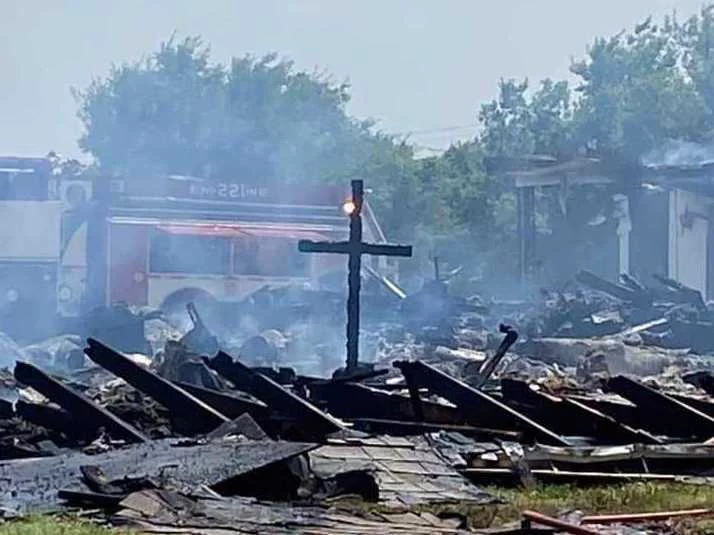
Last Friday, the building where Balsora Baptist Church in Bridgeport, Texas meets burned to the ground, save for the cross pictured above.
When asked to explain the charred cross, Lanita Smith, the wife of the church’s pastor, had this to say:
It showed us that God is there, God is there and he’s going to get us through. [The cross was] used for the members to put their prayer request on. They would, we would write their prayer request on the tags, and they would hang them on the cross. And so we were able to see what different prayer requests we had.
It’s sad, but it’s a happy time that we’re going to, we’re going to get through this and we know God’s in it. We’re just, we’re just going to be anxious to see what God has planned for us.
God is there? God is going to get us through? God’s in it? God has a plan for us? I genuinely feel sorry for the church. They lost an asset that was very important to them. I’m sure they are heartbroken over their loss. Yet, the atheist in me can’t help but question the Heavenly Arsonist’s plan for Balsora Baptist Church. Why burn the church to the ground, leaving only a charred wooden cross? What lesson could the church possibly learn from this, outside of how to file insurance claims? If anything, this story shows how powerless God is when tragedy and adversity strike. God stood helplessly by while the church went up in smoke. Even the cross left in the debris was not his handiwork. The church will pray ceaselessly to the God of Abraham, Isaac, and Jacob, but it will be real flesh and blood humans and insurance that will help Balsora Baptist rise from the ashes. God? He will be busy helping the grannies over at First Methodist find their car keys.
Bruce Gerencser, 66, lives in rural Northwest Ohio with his wife of 45 years. He and his wife have six grown children and thirteen grandchildren. Bruce pastored Evangelical churches for twenty-five years in Ohio, Texas, and Michigan. Bruce left the ministry in 2005, and in 2008 he left Christianity. Bruce is now a humanist and an atheist.
Connect with me on social media:
Your comments are welcome and appreciated. All first-time comments are moderated. Please read the commenting rules before commenting.
You can email Bruce via the Contact Form.

